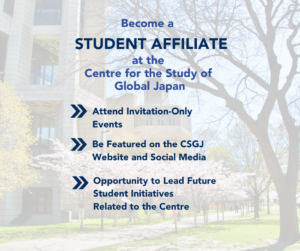The thirtieth session of the Japanese Politics Online Seminar Series (JPOSS) took place
on June 9, 2022. Phillip Y. Lipscy (University of Toronto) chaired the seminar and
moderated the Q&A session.
Yujin Woo (Hitotsubashi University) presented a paper co-authored with Jaehyun Song
(Kansai University), which looks at the effect of repeated government messaging on
public perception of migrants. Drawing from the cognitive psychology literature, the
authors study the competing theoretical expectations that message repetition leads to
increased support for policies due to persuasion (“truth effect”) and decreased support
due to overexposure (“reactance”). Their study also makes use of cross-country
comparisons to investigate the effect of variation in the discursive contexts
surrounding migrant integration. The authors conducted combined framing and
conjoint experiments through online surveys in Japan and South Korea between 2020
and 2021. Their analyses produce mixed findings. On one hand, when respondents are
exposed to vignettes about policies aligned with the government rhetoric, the results
do not lend support to the truth effect or reactance theories. However, the authors do
find evidence of framing effects for policies targeting migrant groups that are less
common to the country context.
Charles Crabtree (Dartmouth College) and Kikuko Nagayoshi (University of Tokyo)
offered insightful comments on the research method and interpretation of results.
During the Q&A session, participants raised questions about the survey design and
offered suggestions on alternative ways to understand the results obtained by the
authors.
This event attracted around 30 participants and produced an engaging Q&A session.
The organizers would like to thank the presenters, discussants, and participants, as
well as the staff at the Harvard Program on U.S.-Japan Relations, who provided
administrative support. We look forward to seeing you at the next session of JPOSS: https://jposs.org/

